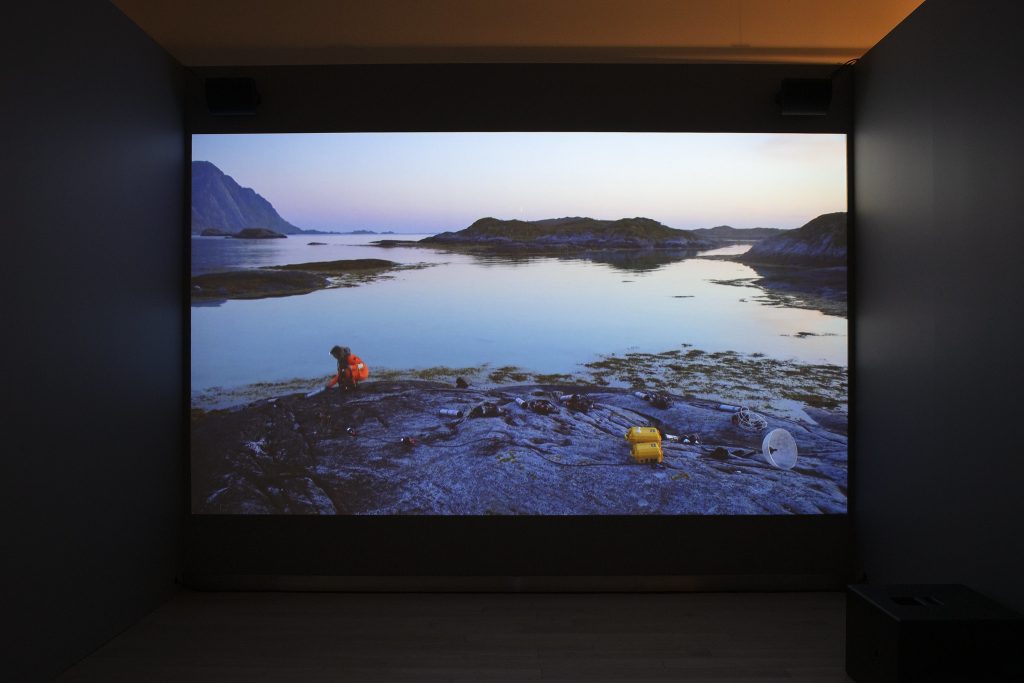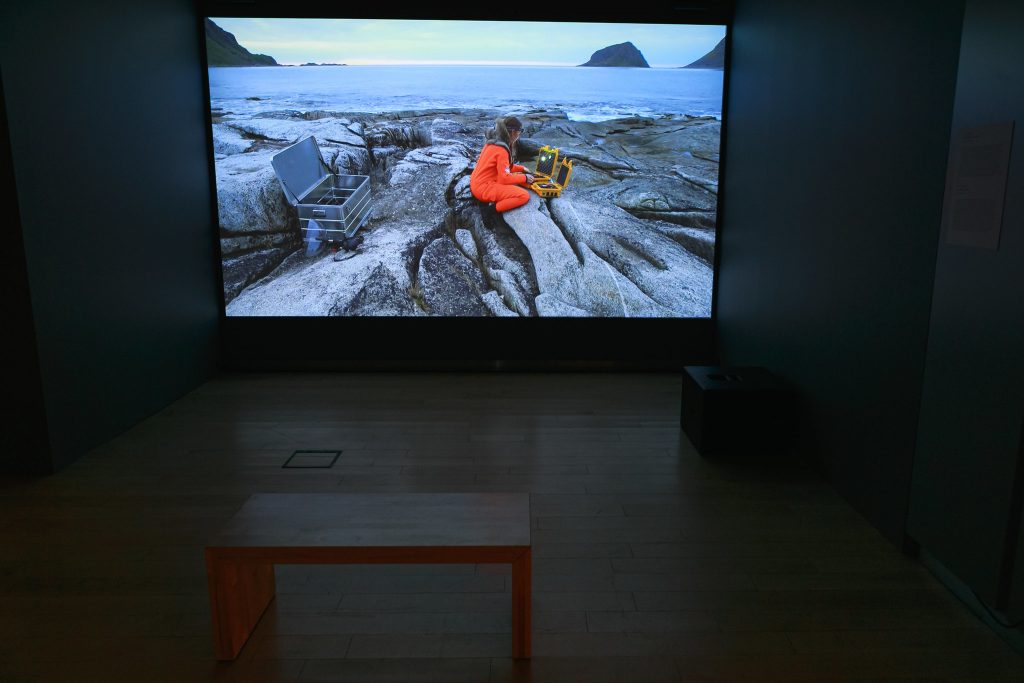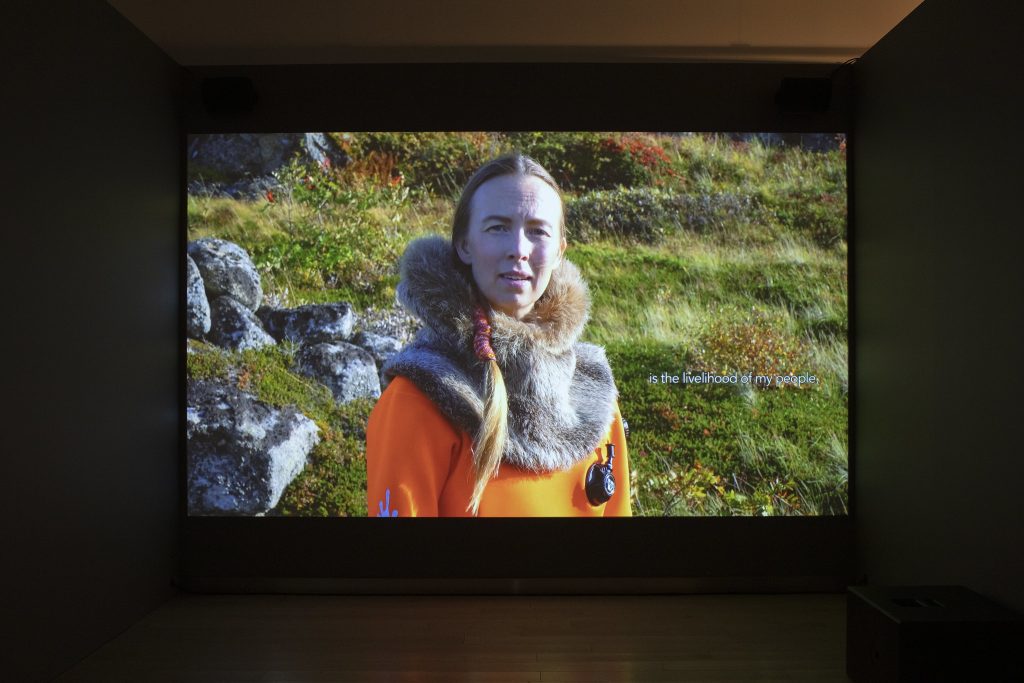Acoustic Ocean
Ursula Biemann
2018, Video projection

Grounded in a research-based practice, Ursula Biemann creates video essays and texts that address the interconnection of politics and the environment across local, global, and planetary contexts. In her most recent work, Acoustic Ocean, Biemann combines scientific, personal, and phenomenological narrative in an exploration of oceanic depths and interspecies relations above and below the waterline of the Lofoten Islands in Northern Norway. The female aquanaut and human protagonist of this semi-fictional narrative places sensing instruments such as hydrophones and parabolic microphones along the shore in search of communication and connection with beings that inhabit the depths below. This watery world holds memories of evolution that span time scales, and also swirl with the possibility of dissolution. Microscopic creatures, for example, with bodies porous and vulnerable to the increasing acidification of their habitat, foretell of an unknown future existence. The narrative takes on a personal dimension when the aquanaut, performed by singer and environmental activist Sofia Jannok, recounts the uneven effects of a shifting climate on the indigenous Sami community of which she is part, and the reindeer on which their economic and cultural sovereignty rely.
Ursula Biemann (Switzerland) is an artist, writer and video essayist based in Zurich. Her artistic practice is strongly research oriented and involves fieldwork in remote locations where she investigates the political ecologies of forests, oil and water. Her video installations are exhibited at the International Art Biennials of Istanbul, Liverpool, Sao Paulo, Shanghai, Gwangju, Montreal, and in museums worldwide. In 2020 she has a solo shows at the Museum for Modern Art in Nice and in Buenos Aires. Biemann received the 2009 Swiss Grand Award Meret Oppenheim.

Akustiskais okeāns
Urzula Bīmane
2018, Video projekcija
Urzula Bīmane, balstoties uz pētījumiem, veido video esejas un rakstus, kas pievēršas politikas un vides savstarpējām saistībām lokālā, globālā un pat planetārā kontekstā. Savā jaunākajā darbā, Akustiskais okeāns, māksliniece veido zinātnisku, personīgu un fenomenoloģisku stāstījumu, lai atklātu okeāna dzīles un starpsugu attiecības virs un zem ūdens Lofotu salās Ziemeļnorvēģijā. Šajā daļēji izdomātajā stāstā, galvenā varone akvanaute gar krastu izvieto sensoros instrumentus, piemēram, hidrofonus un paraboliskos mikrofonus, lai sazinātos un rastu saikni ar būtnēm, kas dzīvo ūdens dzelmē. Šajā ūdens pasaulē ir meklējamas atmiņas par evolūciju, kas virpuļo uz izšķīšanas robežas un aptver vairākus laika periodus. Piemēram, tādas mikroskopiskas būtnes, kuru ķermeņi ir poraini un neaizsargāti pret pieaugošo ūdens paskābināšanos, vēsta par nezināmas nākotnes eksitenci. Stāstījums iegūst personīgu dimensiju, kad akvanaute, ko tēlo dziedātāja un vides aktīviste Sofija Jannoka, sāk stāstīt par mainīgā klimata nevienmērīgo ietekmi uz vietējo sāmu kopienu, kam pieder galvenā varone, kā arī ziemeļbriežiem, uz kuriem balstās viņu ekonomiskā un kultūras suverenitāte.
Urzula Bīmane (Šveice) ir māksliniece, rakstniece un video eseju veidotāja Cīrihē. Viņas mākslinieciskā prakse tiek balstīta pētījumos un ir saistīta ar āra pētījumiem nomaļās vietās, kur viņa pēta mežu, naftas un ūdens politisko ekoloģiju. Viņas videoinstalācijas tiek izstādītas Starptautiskajās mākslas biennālēs Stambulā, Liverpūlē, Sanpaulu, Šanhajā, Gvandžu, Monreālā un muzejos visā pasaulē. 2020. gadā viņas personālizstādes tika izstādītas Modernās mākslas muzejā Nicā un Buenosairesā. 2009. gadā Urzula Bīmane saņēma Šveices lielo Meretas Openheimas balvu.

